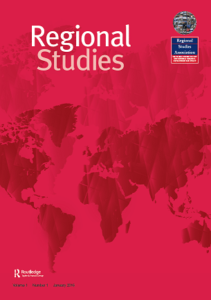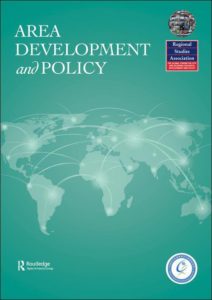As in previous years, the RSA will again have a strong presence at this year’s AAG, which will take place from 3rd to 7th April 2019 in Washington D.C., USA. Amongst a broad variety of sessions, this year’s highlights include the Annual Lectures of our Regional Studies as well as Area Development and Policy journal. Another panel session not to be missed focuses on the topic of publishing and RSA members and editors will unravel the mysteries around this topic in an engaging session. During AAG, we are also part of the Routledge stand in the Exhibition Hall and are very much looking forward to seeing you there. You can download an overview of members’ sessions here.
Download our AAG pocket guide here: AAG 2019 Pocket Guide
Please email Katharina Bürger, email katharina.buerger@regionalstudies.org, if you organise a session or present a paper/poster at the AAG so we can include this in our overview.
Regional Studies Annual Lecture

Random Acts of Greenness: The Need for Cities to Up Their Game on Climate Change
- Thursday 4th April 2019, 15:05 – 16:45, Diplomat Room, Omni, Lobby Level
- Organiser and Chair: Dieter Kogler (University College Dublin, Ireland)
- Panellist: Joan Fitzgerald (Northeastern University, USA)
- Discussant: Harriet Bulkeley (University of Durham, UK)
The recent IPCC report reveals that the planet is close to a point of no return. In view of this alarming mandate, we must support the most aggressive climate actions possible. Yet most cities pride themselves on simply plucking the low-hanging fruit—the easy, inexpensive fixes that require little systemic change. The list is long: bike-rental systems, solar waste containers, weak green building requirements, and some recycling efforts. Going after the low-hanging fruit yields benefits, but unless such measures are part of a larger, coherent strategy for altering broad patterns of energy consumption and transportation emissions, these efforts are simply random acts of greenness.
We must be honest about what cities are accomplishing. Evidence suggests that most cities are not reducing emissions any more than their respective nations and that reductions that have occurred may be due more to state and national than city policy. This does not mean cities cannot lead, but they must greatly accelerate what they are doing and how they are doing it. Focusing on small-bore measures fosters the illusion among elected officials and citizens alike that we are doing enough. Such over-confidence muffles the enormous political will required to take on the climate crisis in a systematic, integrated fashion. We have to call out random acts of greenness for what they are. Rather than celebrating every action a city takes under the banner of “climate change”, we must focus on getting more cities on a path to greenovation.
Area Development and Policy Annual Lecture
Chinese Debt-Trap Diplomacy: The Rise (and Fall) of a Meme
- Thursday 4th April, 17:00 – 18:40, Diplomat Room, Omni, Lobby Level
- Organisers: Dieter Kogler (University College Dublin, Ireland), Michael Dunford (Chinese Academy of Sciences, China), Weidong Liu (Chinese Academy of Sciences, China)
- Introduction: Douglas Richardson (American Association of Geographers)
- Panellist: Deborah Bräutigam (Johns Hopkins University’s School of Advanced International Studies, USA)
- Discussants: Padraig Carmody (Trinity College Dublin, Ireland), Meredith DeBoom (University of South Carolina, USA)
In 2017, a meme was born in a think tank in northern India: “Chinese Debt-Trap Diplomacy.” Furthered by a paper authored by two Harvard students, this meme briefly took deep root in Washington, D.C. and then ricocheted far beyond the Beltway, to the New York Times and beyond. Thundered by a US Secretary of State, wafting quietly through intelligence circles, hovering in Congress, settling briefly in the Pentagon, within 12 months the meme appeared to have “about 1,990,000 results (0.52 seconds)” on Google and was beginning to solidify into firm, conventional wisdom, accepted as a deep historical truth. This talk documents the efforts of one Sinologist Africanist to speak “truth” to “power”. It concludes with a critical exploration of the relationship among the media, the academy and the policy world.
Prof. Deborah Bräutigam is the Bernard L. Schwartz Professor of International Political Economy and Director of the International Development Program (IDEV), and the China Africa Research Initiative (CARI) at Johns Hopkins University’s School of Advanced International Studies (SAIS) in Washington, D.C.
- Friday 5th April 2019, 17:00 – 18:40 (Maryland B, Marriott, Lobby Level)
- Organisers: Dieter Kogler (University College Dublin, Ireland), David Bailey (Aston University, UK), Jennifer Clark (Georgia Institute of Technology, USA)
- Chair and Introduction: David Bailey
- Panellists: Ben Derudder (Ghent University, Belgium), Lisa De Propris (University of Birmingham, UK), Mia Bennett (The University of Hong Kong, Hong Kong, China), Michael Dunford (University of Sussex, UK), Weidong Liu (Chinese Academy of Sciences, China), Thomas Kemeny (Queen Mary University of London, UK), Sam Park (Seoul National University, South Korea), Raquel Ortega Argiles (The University of Birmingham, UK), Maano Ramutsindela (University of Cape Town, South Africa)
This session is aimed particularly at early career researchers and students seeking to publish in high quality SSCI indexed journals. The editors, from several of the Regional Studies Association suite of 5 journals will address different elements of the publishing process, how to approach writing, how to choose a journal, how to title an article, how to write the abstract and how to use social media to maximize the impact of the piece. The session will address the difficulties faced by authors without English as a first language and those whose PhD and research training has not been in the Euro/American tradition.
Economic Geography Sessions
The series of “Economic Geography” special sessions features theoretical and empirical research papers under the heading ‘Evolution, Renewal, Development & Policy’. The various sessions highlight such topics, including innovation space, networks, policy, economic development, knowledge creation, relatedness, specialization, institutions, trade, resilience, and regional growth, amongst others.
Please click on the title of each session to view more information on the AAG website.
Economic Geography I – Knowledge Production Networks & Global Value Chains
Wednesday 3rd April 2019, 08:00 – 09:40 (Diplomat Room, Omni, Lobby Level)
Economic Geography II – Corporate Strategy, Evolutionary Trajectories of Knowledge Production & Smart Specialization
Wednesday 3rd April 2019, 09:55 – 11:35 (Diplomat Room, Omni, Lobby Level)
Economic Geography III – Diversity, Entrepreneurship, Institutions & Regional Economic Development
Wednesday 3rd April 2019, 12:40 – 14:20 (Diplomat Room, Omni, Lobby Level)
Economic Geography IV – Inequality, Affordability, Economic Decline and Replicable and Reproducible Research Approaches
Wednesday 3rd April 2019, 14:35 – 16:15 (Diplomat Room, Omni, Lobby Level)
Economic Geography V – Skills, Jobs, Employment and Mobility
Wednesday 3rd April 2019, 16:30 – 18:10 (Diplomat Room, Omni, Lobby Level)
Economic Geography VI – Smart Insights Into Complexity, Quality, Diversification and Specialization
Thursday 4th April 2019, 08:00 – 09:40 (Diplomat Room, Omni, Lobby Level)
Economic Geography VII – Innovation Systems, Clusters, FDI, and Regional Industrial Dynamics
Thursday 4th April 2019, 09:55 – 11:35 (Diplomat Room, Omni, Lobby Level)
Economic Geography VIII – Culture, Diversity, Innovation & Markets, and the Evolution of the Space Economy
Thursday 4th April 2019, 13:10 – 14:50 (Diplomat Room, Omni, Lobby Level)
Economic Geography IX – Knowledge Production and Flows, and Innovation in China
Saturday 6th April 2019, 08:00 – 09:40 (Hampton Room, Omni, Lobby Level)
Economic Geography X – Spatial Inequality, Environmental Innovation & Sustainability, and Local Economic Development
Saturday 6th April 2019, 09:55 – 11:35 (Hampton Room, Omni, Lobby Level)
Reinstitutionalizing Equity Sessions
Reinstitutionalizing Equity (I): Politics, Governance and the Public Sector
Friday 5th April 2019, 08:00 – 09:40 (Maryland B, Marriott, Lobby Level)
Reinstitutionalizing Equity (II): Work, Occupations and Technological Change
Friday 5th April 2019, 09:55 – 11:35 (Maryland B, Marriott, Lobby Level)
Reinstitutionalizing Equity (III): Climate Change and Resilience Planning
Friday 5th April 2019, 13:10 – 14:50 (Maryland B, Marriott, Lobby Level)
Panel session: Gender, entrepreneurship, and innovation: a regional perspective
- Friday 5th April 2019, 15:05-16:45 (Wilson C, Marriott, Mezzanine Level)
- Organisers: Helen Lawton Smith (Birkbeck University of London), Sharmistha Bagchi-Sen (SUNY-Buffalo) and Yasuyuki Motoyama (University of Kansas)
- Chair: Yasuyuki Motoyama